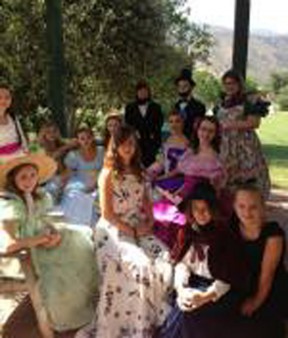 Santa Clarita Valley International (SCVi) charter school held a Civil War reenactment at Rancho Camulos on Tuesday to showcase its students’ knowledge of American History.
Santa Clarita Valley International (SCVi) charter school held a Civil War reenactment at Rancho Camulos on Tuesday to showcase its students’ knowledge of American History.
Guests traveled travel back in time with SCVi’s 8th and 9th grade classes to this pivotal period in American History as they shared what they’ve learned about the Civil War through a Living History Presentation of Learning (POL).
About SCVi
Santa Clarita Valley International (SCVi) is a charter school located in Castaic. The school offers project-based K-12 curriculum and student-led assessment with global and culturally diverse influences. Through an inquiry-based approach to education, the students at the school “learn to learn.” Modeled after successful schools such as International School of Monterey, Guajome Park Academy, and Bill Gates’ High Tech High, we have a learner-centered approach using facilitators. The primary goal of our school is to help learners lead a successful and fulfilled life while contributing to the world around them.
SCVi launched in the fall of 2008. Founded in the research of some of the greatest educational theoriststhe school is based on a constructivist philosophy with portfolio-based assessment. It plans to introduce foreign language, exchange students and teachers, the arts, advisory programs, and physical education as part of the regular curriculum.
Project-based Learning
In project-based learning, students work in groups to solve challenging problems that are authentic, curriculum-based, and often interdisciplinary. Learners decide how to approach a problem and what activities to pursue. They gather information from a variety of sources and synthesize, analyze, and derive knowledge from it. Their learning is inherently valuable because it’s connected to something real and involves adult skills, such as collaboration and reflection. At the end, students demonstrate their newly acquired knowledge and are evaluated by how much they’ve learned and how well they communicate it. Throughout this process, the facilitator’s role is to guide and advise, rather than to direct and manage, student work.
PBL means learning through experiences. For example, high school students design a school for the future and learn advanced math concepts and engineering along the way. Elementary students study single-cell organisms in order to provide data to researchers in a lab. Others build and race electric cars and learn about energy efficiency. Many projects focus on environmental concerns, such as testing pollution levels in local waters and researching methods for cleanup and then reporting findings and strategies for improvement to community officials. What do these projects have in common? All engage students through hands-on, serious, authentic experiences. They also allow for alternative approaches that address students’ individual differences, variations in learning styles, intelligences, abilities, and disabilities.
SCVi Charter School Reenacts Civil War at Camulos